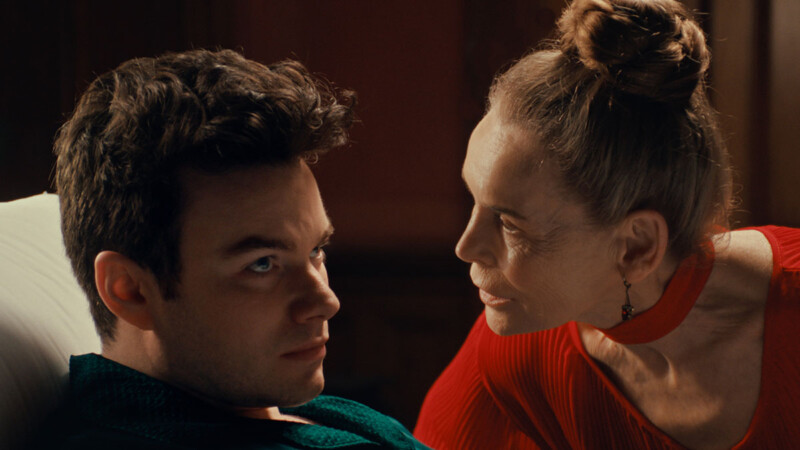Before its world premiere at Fantastic Fest 2025, director Glenn McQuaid (I Sell the Dead) made it clear that The Restoration at Grayson Manor is a queer horror comedy told through a Gothic melodrama lens, stressing that this is not camp. When McQuaid, who co-wrote the screenplay alongside author and screenwriter Clay McLeod Chapman (Ghost Eaters: A Novel), shared many of the movie’s soapy inspirations on Instagram, he included 1987’s queer erotic thriller Law of Desire and explained how the film “showed how cinema could be dangerous and liberating and fun all at once.” The filmmaker effectively leaned into those elements, creating a truly memorable experience.
The Restoration at Grayson Manor stars Golden Globe winner Chris Colfer (Glee) as Boyd Grayson, a hedonist and pianist who is in a constant contentious standoff with his legacy-obsessed mother, Jacqueline (Alice Krige). The last two Graysons — who apparently used to be close before Boyd came out as bisexual and his mother forced him through various traumatic “treatments” such as aversion therapy and shock therapy — are essentially stuck living together in their massive family estate, especially after a horrific accident leaves Boyd handless.
Instead of immediately taking Boyd to the hospital, he wakes up to discover that his mother has hired a medical team to care for him at home, where Jacqueline has converted a wing of the manor into a state-of-the-art recovery ward. She’s also had a change of heart about taking away his inheritance since Boyd was injured saving his mom from the falling, broken shards of a heavy mirror that took his hands in an intentionally over-the-top scene that sets the tone for the rest of the movie.
His inheritance is the least of Boyd’s concerns as the younger Grayson quickly learns that one of his new 24/7 caregivers, Dr. Tannock (Daniel Adegboyega), is developing prosthetic hands for Boyd. But these are not traditional hand prostheses; Boyd will become the first patient in history to use prosthetic hands powered entirely by his subconscious. As Tannock explains, his invention is an injectable nanotechnology, a type of synthetic nervous system introduced at the accident site. The doctor believes his work in neural prosthetics will revolutionize the merging of humans and machines, that this is “how humans transcend,” which is never a good sign when a “mad genius” makes a statement like that in a movie like this.
The rest of the movie centers around Dr. Tannock helping Boyd attempt to meld with the prosthetic hands via his subconscious as we learn more about the other caregivers, Claudia (Gabriela Garcia Vargas), Boyd’s nurse/therapist, and Tannock’s assistant, Lee (Declan Reynolds). There are mysteries surrounding all of these characters, some predictable but no less compelling. As wild truths come to light and Jacqueline continues to prove to be the absolute worst kind of mother, Boyd’s new hands begin to lash out on his behalf as the connection between the killer hands and his subconscious, weighed down by generational trauma, grows stronger.
Staying true to the melodramatic tone, this movie embraces the exaggerated and the ridiculous on every level, from its characters to the escalating (and imaginative) violence and the multiple twists, turns, and shocking betrayals. The Restoration at Grayson Manor is also heavily focused on the plot, rather than character growth, centered on these experimental prosthetic hands and the consequences that everyone must suffer. Still, there are significant character beats for Boyd that briefly set aside the theatrical dramatics and give the audience moments of connection with the key character. Much of his character on-screen is either seductive or perpetually brash. His hostile attitude is understandable when he is forced to interact with his icy mother, who is eternally driven by the expectations of heteronormativity, but the scenes where the layers are stripped back and we get glimpses of the real Boyd underneath it all (especially when he’s put through the emotional wringer) are Colfer’s best work in the film.
Krige, who last appeared at Fantastic Fest in 2021 for Charlotte Colbert’s feature directorial debut She Will, is always a standout in every project she’s been a part of. She nails Jacqueline’s demeanor as a domineering matriarch focused solely on her desire to “fix” Boyd as well as manipulating her son into giving her a grandchild, an heir to continue the Grayson legacy, and handles the rare moments of motherly love with the proper amount of emotion that never redeems her, but lets the audience know some part deep within her toxic core maybe does love her son. (Yet, most of the time, it’s fairly clear the Grayson name and status are all she truly cares about, and Krige knows how to maintain that balance.)
Despite their obvious hatred for each other, there are a few moments of strange, often humorous bonding between Boyd and Jacqueline throughout the movie that seemingly draw on whatever loving familial relationship they had (that Boyd acknowledges once existed in a dream) that is now full of vitriol. Boyd will forever resent his mom for rejecting his queerness and trying to condition him in abusive ways to be heterosexual and meet his mother’s relentless demands and expectations, and Jacqueline will always resent her son for his extreme party lifestyle, how he lives to spite her, and for denying her an heir that can continue the Grayson legacy that means so much to her.
The Restoration at Grayson Manor is darkly funny, sexy, brutal, surprising, enraging, and at times, even heartbreaking. It may take a moment at first for some viewers to embrace the bold tone and style of the movie, but they will ultimately be hooked by McQuaid and Chapman’s entertainingly unhinged narrative, bolstered by strong performances from every player and the film’s emotional sincerity. The ending is equal parts frustrating, hilarious, and entirely appropriate for a mother and son tied together in an unending, destructive relationship that destroys everyone else in its path.

